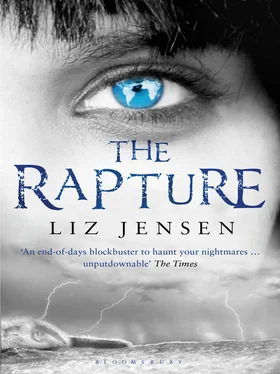I close the blind to banish her but I fail. Because whether or not it was her aim, she has succeeded in unsettling me.
That night, I lie awake thinking, unable to sleep. Harish Modak is right, I decide, that humans are short-termists by nature, and only far-sighted political vision can halt the damage to the biosphere. But part of me — the part that has got me this far, despite all that has happened — refuses to agree with him that such vision will never come into being. I didn’t survive a horrific car accident in order to let Washington, Delhi and Beijing cook me to death. Cuando te tengo a ti vida, cuanto te quiera , I murmur: my tiny foreign mantra of cheer. I’m normally good at switching off from work, but Bethany Krall pesters her way in. The hoarse grate of her voice in my ear. Her wayward, carefully enunciated menace. You had two hearts and one was gone. So someone died . I keep remembering the feel of her fingers on my pulse. Like a doctor who meant me no good.
My colleague Dr Hussan Ehmet is a melancholy Turkish Cypriot with sloping shoulders and badly groomed hair, whose claim to professional fame is a study of mass hysteria and religious cults in the Far East, soon to be published as an academic book by Oxford University Press. Although he is not the most charming of men, he charms me. I like the way he wears his loneliness and erudition on his sleeve, the way he gives a small ‘heh’ when he’s cracked a medic’s dry almost-joke.
‘Genuine tragedies in the world are not conflicts between right and wrong. They are conflicts between two rights. Heh. Bethany’s is the conflict of two rights. Hers and ours. What puts her into a state approximating to happiness, or perhaps even transient bliss, heh, is a regular dose of electricity applied directly to the brain. The interesting thing is, the rather remarkable thing is, she now requests it herself,’ he tells me over an execrable canteen lunch. ‘She can feel its beneficial effects. I suspect that within a few months, the suppressed memories will start coming back. Some of these children, they are basically like cats and dogs. You know. Carnivorous animals, sometimes they eat grass to help their digestion. They know what they need when they’re sick, heh. It’s instinct.’ It strikes me as a curiously crass thing for a psychiatrist to say, especially one who can quote Hegel at you in the lunch queue, but perhaps he is right. ‘She’s unpopular with the therapists because she’s intuitive. She picks up on moods. Her perceptions can seem a little, what-is-the-word, uncanny at times. It disturbs people.’ I try to look surprised, wryly amused, as though I am not implicated. I don’t know if I succeed. ‘Like Joy McConey. Poor woman.’
‘What was her relationship with Bethany like?’ I ask, curious that he has mentioned my predecessor because her name tends to go unspoken at Oxsmith.
‘Understandably troubled,’ says Dr Ehmet. But now he looks embarrassed. He regrets having spoken.
‘But why?’ I warned her about what would happen. ‘Is Joy…ill?’
He nudges at a falafel with his fork. ‘In a manner of speaking. Joy’s circumstances were very unfortunate,’ he mumbles. ‘She drew — er, unprofessional conclusions about Bethany.’
‘Such as?’
But he shakes his head, splits his falafel, and contemplates its mild protein steam. ‘We are all hoping Joy will return, so you will understand if I don’t say more.’
I nod to acknowledge this. ‘But what about you? Where do you stand with Bethany?’
‘I’m purely on the, er, electrical side in this case. Heh. So I don’t have to listen to her,’ he says, squashing the falafel with his fork so that its grains mash up through the tines. ‘I just give her the volts.’
The Quiet Room is clinic-white. I’m in the adjoining observation annexe where, through the thick glass screen, I am about to witness Bethany having ECT. Dr Ehmet has been explaining that the procedure, once disturbing, has become fairly banal to watch, thanks to the general anaesthetic and muscle relaxant. ‘Oh yes, the days of high drama are long gone, heh. No more violent fitting. No more patients swallowing their tongues or spitting out their teeth.’ He sounds a little nostalgic about it. ‘It’s still controversial because there’s memory loss. And the fact is, still no one knows why it works. One theory says that the shock stimulates the neuroendocrine system, and balances the stress hormones. Then there’s another one that says it’s not about hormones being rearranged, but the chemicals in the brain. Others reckon it’s just wiping out brain cells. But I think if they are being wiped out, they’re being renewed. More constructively.’
I don’t recognise Bethany at first, when a nurse wheels her in on a trolley bed. She’s clad in a white hospital gown and her hair is scraped back from her face. Without make-up she looks even younger. Spotting me at the far end of the room, she points at her forehead, sketches a swift lightning-bolt in the air, and smiles the triumphant smile of a terrorist whose demands are being fully met.
The ECT machine itself is unspectacular, consisting of a rectangular box with coloured wires emerging, and a dial.
‘It is time for the IV now, Bethany,’ says Dr Ehmet. It’s matter-of-fact: they have clearly done this many times before. She proffers her skinny little arm. The criss-cross of razor slashes goes all the way up. ‘I’m putting in an IV of Brevital,’ Ehmet explains, catching my eye and mouthing clearly. ‘An anaesthetic.’
As it goes in, Bethany’s eyelids close like those of certain dolls I had as a child, comatose the moment they horizontalise. Her face, normally volatile, instantly relaxes, as though unconsciousness has forced her features to sign a temporary peace accord with one another. The nurse inserts a new IV. ‘A muscle relaxant,’ indicates Dr Ehmet. ‘To prevent broken bones and cracked vertebrae. It’s a seizure we’re giving her after all.’ Dr Ehmet is one of those men who enjoys conveying information. Since I’ve already read about the procedure on the web, he hasn’t yet told me anything I don’t know, but I’m happy to see the theory put into practice, and for him to talk me through it. The nurse wipes Bethany’s forehead with a damp cloth, then gently parts her lips and inserts a rubber mouth-guard over her teeth — ‘to prevent tongue damage,’ Dr Ehmet explains, as he applies gel to two padded electrodes, and fits a breathing mask over her nose and mouth. On the anaesthetist’s nod, he applies the pads to her temples and holds them in place. Nothing visible happens.
‘I’m, heh, shooting an electric current into her brain now. A level-two dose, stimulating a grand-mal seizure that will last for precisely ten seconds. It’s all in the timing.’
Although there’s still no sign that anything has happened — no convulsions, no twitching, no noise — an unexpected wave of revulsion brings me close to gagging. It’s like watching one of those anti-vivisection campaigns showing grainy footage of a tiny tragic macaque monkey pinned to a slab. Dr Ehmet has a professional eye on the digital clock. ‘And then release.’
He removes the electrodes: under the sheet, Bethany’s toes curl and flex, reminding me of speeded-up footage of bracken unfurling. Dr Ehmet gestures to me to come closer. Positioning myself next to Bethany’s head, I am oddly tempted to touch her brow, where the pads went, but I resist the urge.
‘There we are. Logged off,’ says Ehmet. ‘It’s only a light anaesthetic so she’ll wake in a couple of minutes. She won’t look a million dollars, as they say. Or should it be euros? Heh. But she’ll feel like new.’
Five minutes later Bethany’s eyes flick open and she groans, then yawns. Just as Dr Ehmet predicted, she does not look a million, in any denomination. In fact, she’s monstrous: ragged and bleary and punch-drunk, a preview of herself at forty. Her pupils are wildly dilated and when she sits up, groggily, she holds her head as if her sense of balance is impaired.
Читать дальше












